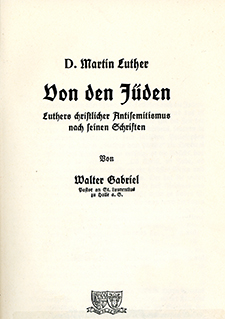Nuremberg Laws
The “Reich Citizenship Law” and the “Law for the Protection of German Blood and German Honor” were enacted on September 15, 1935 at the NSDAP’s 7th Nuremberg Party Rally, the so-called “Rally of Freedom”. These “Nuremberg Laws” made Jews citizens with inferior rights.
Thenceforth only “citizens of the Reich” continued to enjoy full political rights; only persons of German or kindred blood could be citizens of the Reich, however. Jews were no longer allowed to hold any public office. Marriages and premarital sexual relations between Jews and non-Jews were forbidden under threat of punishment. Jews were also prohibited from employing German women younger than forty-five in their homes and from flying the Reich and the national flag.
The Protestant church governments kept silent about the Nuremberg Laws. The Gestapo’s confidential reports on the situation and morale indicate that a majority of the Protestant populace presumably welcomed the legal ostracism of the Jews.
Some Protestants appear to have had hoped that the alarming acts of anti-Semitic violence would cease with the “clear” provisions of the Nuremberg Laws. The conviction that the state fundamentally had the right to take action against the Jews in its sphere was widespread among pastors.
This view even extended deeply into the Confessing Church. The publication in 1936 of the treatise “D. Martin Luther. Von den Jüden. Luthers christlicher Antisemitismus nach seinen Schriften” (Dr. Martin Luther. On the Jews. Luther’s Christian Anti-Semitism from His Writings) by Walter Gabriel, a Confessing Church pastor in Halle, is one example of this.
In his treatise, Gabriel advocated Christian anti-Semitism that loves the enemy it combats. He considered the resolution of the Jewish Question to be a task shared by church and state. The state must grant the church complete freedom to evangelize the Jews, whereas the racial and social details ought to be left to the state. The church must accept whenever the state believes it has to take action against the Jews as subversive.
Gabriel’s theses were controversial in the Confessing Church. Nonetheless, even a synod resolution that would expressly grant the state the right to introduce legislation against die Jews was called for at the 3rd Confessing Church Synod of the Evangelical Church of the Old Prussian Union in Berlin-Steglitz from September 23 to 26, 1935.
While this resolution did not come about, a statement urged by a minority against the persecution of Jews was also not delivered. After heated debates and in view of the state’s increasing reprisals against the church, the synod only managed to arrive at an admonition in a message to parishes to continue undertaking “baptisms of Jews”, too. It remained silent about the Nuremberg Laws.
Source / title
- ©Evangelische Arbeitsgemeinschaft für Kirchliche Zeitgeschichte München, KK 48.7410

